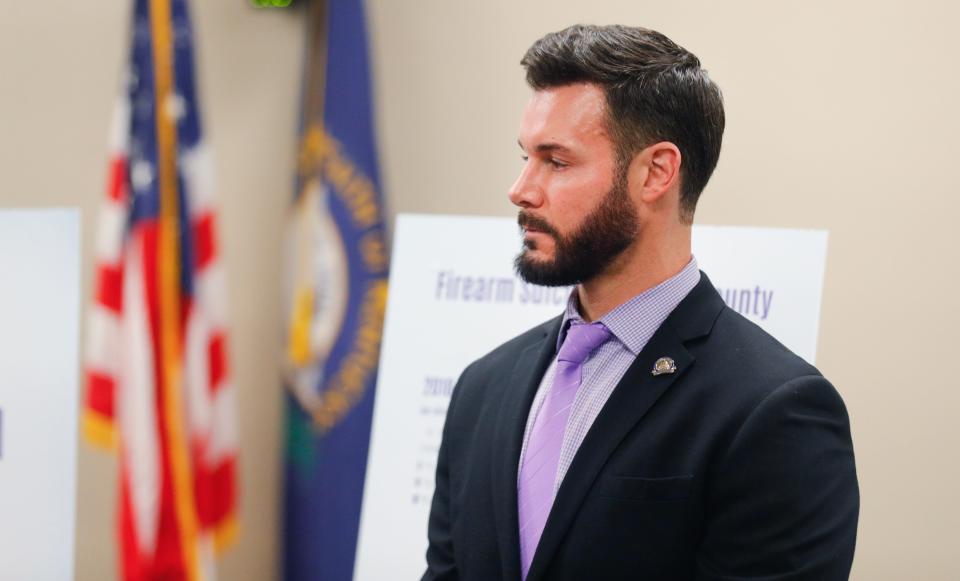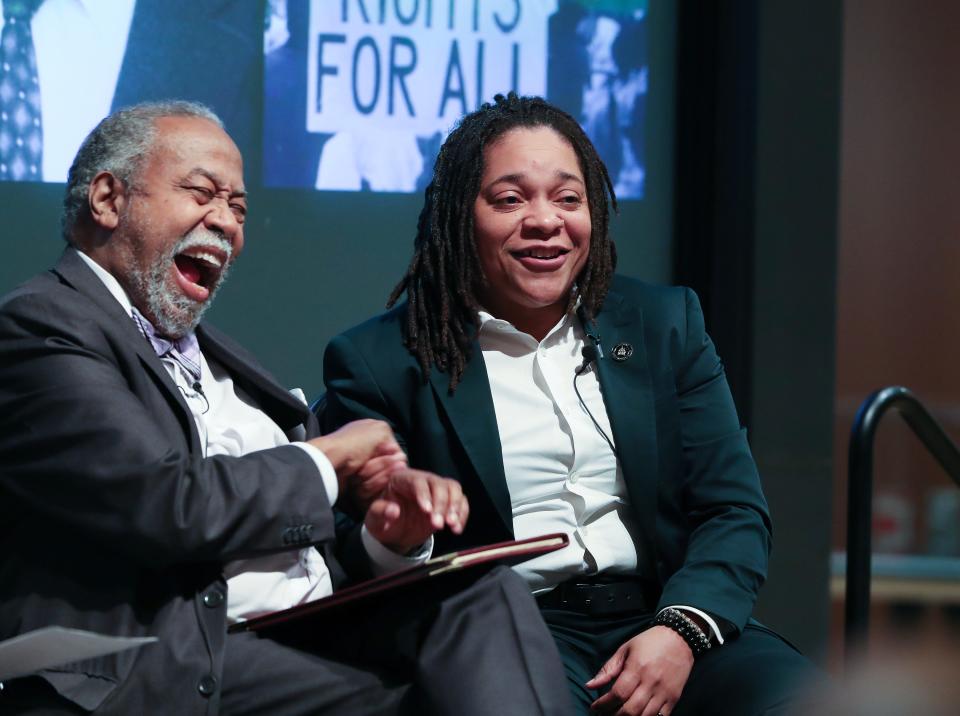How Kentucky Democrats got a few bills ― 7, in all ― across the finish line this session
- Oops!Something went wrong.Please try again later.
- Oops!Something went wrong.Please try again later.
FRANKFORT — There are many ways to kill a bill, and just one way to get it into law.
In other words, a bill before the Kentucky legislature is much more likely to die than to get passed. Disagreement, indifference or even just the ticking clock can kill a bill, while a confluence of favorable factors must line up in both the House and Senate to get a bill passed.
Lawmakers reconvened Friday for two final days of the legislative session. They are likely to override bills vetoed by Gov. Andy Beshear over the last two weeks, as well pass a few last-minute bills.
But most of the legislative work is over for this session. This year, lawmakers proposed over 1,200 bills. Of those, fewer than 200 have so far gotten final approval from both the House and Senate.
That relatively low chance of success didn’t stop lawmakers from both parties from proposing bills aplenty.
Renegade Republican Sen. Adrienne Southworth, R-Lawrenceburg, led the pack, sponsoring a whopping 53 bills. Democratic Sen. David Yates of Louisville was next in the rankings, with 23 bills sponsored.

Over in the House, budget chairman Rep. Jason Petrie, R-Elkton, sponsored 21 bills — many of them budget bills ― and his colleague, Rep. Kim Moser, R-Taylor Mill, sponsored 20.
But sponsoring lots of bills doesn’t necessarily maximize a lawmaker’s chances of getting a bill passed.
Often, what’s more important than how many bills you have is who you are and how much power you wield.
Case in point? Senate President Robert Stivers, R-Manchester, served as the main sponsor for only one bill, the aptly titled Senate Bill 1, which passed unanimously. The bill, which has now been signed by Beshear, will create an endowed research fund for Kentucky’s public universities.
It’s even more unlikely that you'll get a bill passed if you are a Democratic lawmaker in the Republican-controlled legislature.
So far this year, Democrats have managed to get seven bills across the finish line — less than 4% of all bills passed.
"What it says to me is that partisanship is alive, and it works sort of the way we expect it to," said Joel Turner, a professor of political science at Western Kentucky University. "(Republicans) have such an overwhelming majority of seats, and so Republicans can basically do what they want to do."
Keys to success include focusing on an issue likely to get bipartisan support and being able to shake off disagreements with Republican lawmakers, Democrats told The Courier Journal.
Crime bills divide ― but they can also unite
This year, despite high profile and divisive debates about a sweeping criminal justice reform bill called the Safer Kentucky Act, Democratic bills focused on crime victims’ rights drew bipartisan consensus.
Three of the seven Democratic bills passed focused on helping crime victims. Those were sponsored by Rep. Keturah Herron, Sen. Denise Harper Angel and Yates, all of Louisville.
Herron’s bill specifies that Kentucky law enforcement agencies can contract with retired officers to conduct cold case investigations. Harper Angel’s bill expands the state’s crime victim compensation program. Yates’ bill sets up the Ashanti Alert system in Kentucky to help find missing adults.

Herron said framing her bill as a victims’ rights measure and support from cosponsor Rep. John Blanton, R-Salyersville, a retired state police major, were both key to getting her bill passed.
Support from law enforcement and crime victims was also key to Harper Angel and Yates’ success, they said.
"Some of the police detectives who really cared a whole lot about this, I think, helped get it across the finish line,” Yates said, while Harper Angel pointed to "collaboration with advocates, survivors and colleagues."
Herron also said lawmakers of any party need strong relationships with fellow lawmakers. One way she’s cultivated those is by serving on a lot of committees.
Yates said he proposed a similar bill last year that failed to get traction, so he used the legislative off-season to lobby for his bill with both House and Senate members. He also tries to help other lawmakers make their bills better, which has helped him "build a little bit of respect and camaraderie."
The success of the Democratic-sponsored crime bills is not surprising to Turner, the political scientist. The seven Democratic bills are "largely just examples of where Democrats ... are willing to work with Republicans on things that Republicans wanted to do."
A 'shake it off' attitude
Legislative debates, whether in committee or on the House or Senate floor, often get heated. Time is short, and the stakes are high.
But Democratic lawmakers said they try to adopt a “shake it off” attitude when it comes to those moments.
Herron said she is always aware that she represents not just her own district, but also the communities of Black, female and LGBTQ Kentuckians ― as well as the whole state.
“I don’t have the privilege to hold that grudge or say I can’t work with someone … because of the way they voted on something or what they said about something,” Herron said. “I try to go in everyday and work on topics on which there is synergy.”
Yates reiterated that: “We pass some bad bills and, I mean, there's a sickness in my stomach … I've got to be able to recover, shake the last one off and move forward because that's what (constituents) elected me to do.”
He put that strategy to use this session: One of Yates' signature bills, which would add exceptions to Kentucky's near-total abortion ban, failed to get a Senate committee assignment this session, an apparent violation of procedural rules.
But Yates waited until after his Ashanti Alert bill got final passage near the very end of session before launching a protest about the failure of his abortion-exceptions bill to get a committee assignment.
Shut out?
Democratic lawmakers emphasized they often find areas of agreement with their Republican counterparts.
“We definitely disagree about a lot of things. We have more things in common, and we agree on more things than people might realize,” said Louisville Democrat Sen. Cassie Chambers Armstrong, who got her first bill passed this year. SB 240 will allow foster care parents who telework to get child-care benefits.

But that doesn’t mean that everyone’s happy with how the Republican supermajority governs.
“There are a few people who are centralizing power in Frankfort, and they're pushing through their own agenda while ignoring other good ideas that could be really helpful to Kentucky, and I think that that is a failure of leadership on the majority party side,” said Rep. Rachel Roberts, D-Newport.
Roberts said being shut out of policy-making because she is a Democrat has contributed to her decision not to run for re-election. She said she thinks she has done good work in Frankfort, but that she wants to explore other ways to help Kentuckians since it’s so hard to get bills passed.
However, Republican leaders deny they are deliberately shutting out Democrats.
“The Senate Majority Caucus is a policy-driven caucus that has and will continue to support sound public policy proposals, despite which chamber or respective party brings the proposal forward,” said Senate majority spokesperson Angela Billings in a statement.
Billings said the current party make-up of the legislature was determined by voters and that “the conservative policy and fiscal responsibility we have embraced since 2017 reflect the desires of our constituency.”
And the fact that Democrats got seven bills passed this session represents some degree of courtesy to the minority party, said University of Kentucky political scientist Stephen Voss.
"There's no plagiarism in legislating," Voss said, pointing out that there's nothing to stop Republican lawmakers from taking up Democratic ideas and repackaging them as majority-party bills. "Allowing a Democrat ... to be the lead or sponsor and move the bill forward still represents something of a courtesy."
Why sponsor a bill at all?
There are many reasons lawmakers sponsor bills — even if they know the bills will not get passed, Democrats told The Courier Journal.
"It's really important to put out bills as a way to show the public what alternate policies would look like, to sort of say, 'these are values that we could express through policymaking,'" Armstrong said. She said proposing unlikely bills can start the process of building support for a policy.
That's something Herron hopes will happen with a bill that she's proposed three times that has never gotten traction. It would create an “Office of Safer Communities” to develop strategies for reducing violence. The fact that the measure has never advanced beyond a committee is unlikely to stop Herron, who is running for state Senate this November, from proposing the bill again next year.
And there's no harm done at the ballot box if a lawmaker proposes a lot of bills that don't move ahead, said Voss, the political scientist.
"For the most part, voters don't care about their legislator's batting average," Voss said, though if voters like a policy, that could contribute to positive perceptions of the lawmaker.
Turner, the Western Kentucky University political scientist, agreed. He said voters are far more interested in the outcomes of the legislative process — and the impact on their daily lives — than whether a lawmaker sponsors a particular piece of legislation.
Democratic bills passed this session
House Bill 378, Rep. Al Gentry, Louisville: Designate coal as official rock of Kentucky
House Bill 551, Rep. Keturah Herron, Louisville: Allow law enforcement agencies to hire retired officers to work on cold cases
Senate Bill 14, Sen. Reggie Thomas, Lexington: Make changes to the Board of Cosmetology, including adding a nail technician and esthetician to the board
Senate Bill 45, Sen. David Yates, Louisville: Establish Ashanti Alert system in Kentucky to help find missing adults
Senate Bill 240, Sen. Cassie Chambers Armstrong, Louisville: Provide child care benefits to foster care parents even if they telework
Senate Bill 259, Sen. Denise Harper Angel, Louisville: Make changes to the board of the West End Opportunity Partnership (this measure was vetoed by Beshear).
Senate Bill 319, Harper Angel: Expand crime victims' compensation program
Reach Rebecca Grapevine at rgrapevine@courier-journal.com or follow her on X, formerly known as Twitter, at @RebGrapevine.
This article originally appeared on Louisville Courier Journal: The bills Kentucky Democrats got passed this legislative session.

